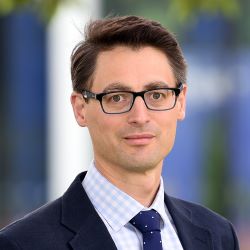- Research Group Leader, Early Cancer Institute, University of Cambridge
- Krishnan-Ang Distinguished Group Leader, Urological Malignancies Virtual Institute (UMVI).
- Honorary Consultant Urologist, Addenbrooke’s Hospital, Cambridge
- Cancer Research UK & Royal College of Surgeons Clinician Scientist Fellow
Biography
Tom Mitchell studied medicine at Oxford University before training in urology in the East of England (2011-2018). He was awarded Fellowship of the Royal College of Surgeons in 2018. He now practices as a Consultant Urologist at Addenbrooke’s Hospital, where he specialises in the surgical management of patients with kidney cancer. His scientific training includes a DPhil in Engineering Science from Oxford University. During his clinical training he held an Academic Clinical Lectureship at Cambridge University (2014-2018). In 2018 he was awarded a Cancer Research UK Clinical Scientist Fellowship at the Wellcome Sanger Institute, prior to becoming a Group Leader in the Early Cancer Institute in 2023. His group aims to improve outcomes for patients with urological malignancies through developing clinically useful methods to predict tumour behaviour, and implementing strategies to prevent incurable disease. In October 2024 Tom was appointed as the Krishnan-Ang Distinguished Group Leader in the Urological Malignancies Virtual Institute (UMVI). His appointment was funded through a generous donation by the Krishnan-Ang Foundation to Trinity College.
The Mitchell Group aims to improve outcomes of patients with kidney cancer, focussing on two main areas. The first aim is to better predict the cancer behaviour by applying sequencing technologies to uniquely annotated clinical specimens. The second aim is to better understand the dynamics and response of the tumour micro-environment to systemic therapy.
In order to meet these aims, the groups has nurtured important clinical collaborations including at Addenbrooke’s and the Royal Free Hospital, scientific collaborations within the Early Cancer Institute and the wide Cambridge Biomedical Campus, the Wellcome Sanger Institute and University College London. The work is currently funded through Tom’s Cancer Research UK & Royal College of Surgeons Clinician Scientist Fellowship, and also a jointly awarded International Alliance for Cancer Early Detection (ACED) grant.
Publications list:
Google scholar: https://scholar.google.com/citations?view_op=list_works&hl=en&hl=en&user=LxXlEXUAAAAJ

